Revivals are nothing new in automotive history, and they will undoubtedly continue for as long as we are dependent on motor vehicles as our primary source of personal transport. Chrysler retired its revered “300” badge at the end of 1971 but revived it for a single year in 1979 as an options pack based on the Cordoba Coupe. Production estimates vary, but the newly released 300 offered enough features to help it stand out from the crowd. Our feature car is a tidy survivor that is unmolested. It has a genuine 48,000 miles on the clock and needs nothing but a new owner who will appreciate all that it has to offer. Located in Guttenberg, Iowa, you will find it listed for sale here on eBay. The owner has set the BIN at $21,500, but he leaves the option for interested parties to make an offer. Once again, I must say a big thank you to Barn Finder Larry D for spotting a rare classic for us.
The original versions of the legendary Chrysler 300 series had traded on a reputation of performance, luxury, and exclusivity. The company was keen to embrace those themes with its latest offering, but doing so was by no means a cheap exercise for potential buyers. It added an eye-watering $2,000 to the sticker price of the Cordoba, but it was nothing if not distinctive. Apart from a limited number that wore red paint for the Canadian market, all cars were finished in Spinnaker White, as we see on this example. The package also brought a revised grille, unique badges, quarter windows with the “300” logo etched into them, and alloy wheels. If you examine the car carefully, you won’t find a single “Cordoba” badge anywhere. It might have had its roots firmly based on that car, but Chrysler wanted potential buyers to view it as a standalone model like the earlier versions of the 300. The paint on this car is in excellent condition for its age, with no significant flaws or problems. The red landau-style vinyl top is equally impressive, and the tinted glass appears to be flawless. The panel gaps are not as consistent as you might hope, but this was one of the quality control issues that was plaguing the company at the time. Therefore, they are probably about as good as you could hope to find on virtually any Chrysler product of this era. The other problem that plagued these cars was rust, and it would take a few years before the company could make progress on this front. However, this 300 looks remarkably clean, and my logic tends to be if it has lasted this long without the dreaded tin worm, it must be a good car that has the potential to last for years without any issues. The exterior trim looks tidy, and there are no marks or stains on the factory alloy wheels.
If the exterior of the 300 is classed as relatively refined and subtle, the interior makes a bold statement. Any potential buyers who didn’t like red trim and upholstery would probably turn their back on these classics. The package brought red leather on the seats, while the remaining upholstered surfaces wore red vinyl. The dash is a sea of red, while the carpet continues that theme. Relief from this is provided by the engine-turned gauge surround and dash insert, with a matching piece on the console surrounding the shifter. Once we look beyond the color and consider the condition, things look pretty promising. The leather on the seats shows some slight wear, but a leather specialist should be able to address this with little cost or effort. The remaining trim is in excellent order, as is the carpet. It seems to need nothing, and nobody has made any aftermarket additions that might impact potential values. When you consider the overall cost of the 300 package, the interior isn’t loaded with luxury appointments. Apart from the leather trim and console, the buyer finds themselves with air conditioning, cruise control, a leather-wrapped wheel, a factory tachometer, a remote exterior mirror, and an AM/FM stereo radio.
By 1979, V8 engines had become a shadow of their former magnificent selves. Most were wheezing and asthmatic lumps of iron that offered little in the way of performance potential. Chrysler at least made some effort to impart performance credentials on the 300 by equipping it with a special version of the 360ci V8. This was the E-58 version that also found its way into Police Specials and the Dodge Li’l Red Express. This engine should be producing 195hp, and while that might not sound particularly impressive, it’s worth remembering that this was an era when cars with more sporting pretensions like Ford’s Mustang struggled to offer 140hp. The power needs to find its way to the road, and it does so via a 3-speed TorqueFlite transmission and a 3.23 rear end. Power steering and power front disc brakes were standard equipment, as were upgraded springs, torsion bars, shocks, and other components that helped make the 300 a surefooted classic. While the power figure looked respectable, the vehicle’s overall weight crept beyond 4,000lbs. That means that while the ¼ mile ET of 17.2 seconds might not look that flash by today’s standards, during The Malaise Era, that figure stacked up pretty well. With 48,000 miles on the clock, this Chrysler should be able to offer its next owner many years of reliable service. For those potential buyers seeking immediate fun, this car can deliver on that front. The owner says it runs and drives extremely well, so the open road beckons that next owner.
The 1979 Chrysler 300 represents a revival that was poorly timed. Financial pressures meant that many potential buyers who fitted this car’s target demographic had begun to tighten their belts. Justifying the considerable additional expense of a 300 over a regular Cordoba was difficult, and some buyers even chose to forge updating their existing car entirely. Actual production figures are hard to pin down precisely, with various sources placing the figure anywhere between 2,900 vehicles and 4,292. However, a figure of around 3,800 seems to be consistent, and that’s the number that I tend to accept. Far from being the sales success that Chrysler sorely needed, it was a model on which they barely broke even. That meant that Chrysler decided to kill the 300 as suddenly as they revived it. How many survive today is anybody’s guess, but it is safe to say that rust has probably claimed a few scalps. As American manufacturers developed an understanding of fuel injection and electronic engine management systems, many more of these fell by the wayside as owners considered them to be underpowered and inefficient. When you look at the recent sales history and cars available on the market today, the BIN on this example is right at the top end of what you might expect to pay for a pristine example. I believe that the seller might be aiming a bit high, so if this classic does tick the boxes for you, it could be worth submitting an offer. After all, the worst that he could say is no.
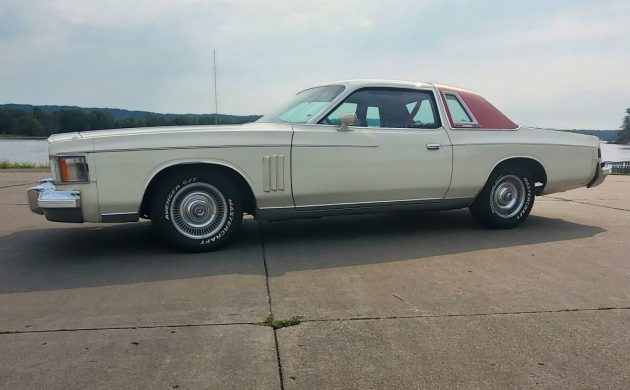
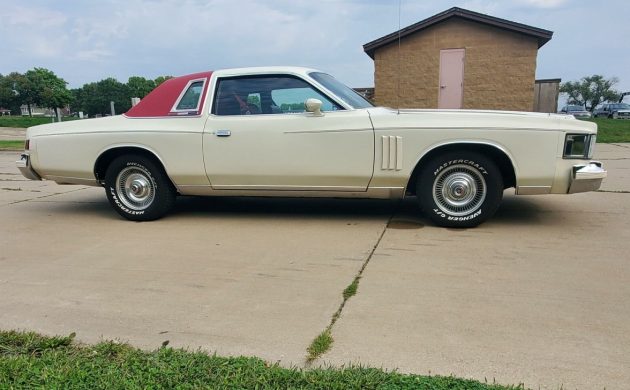
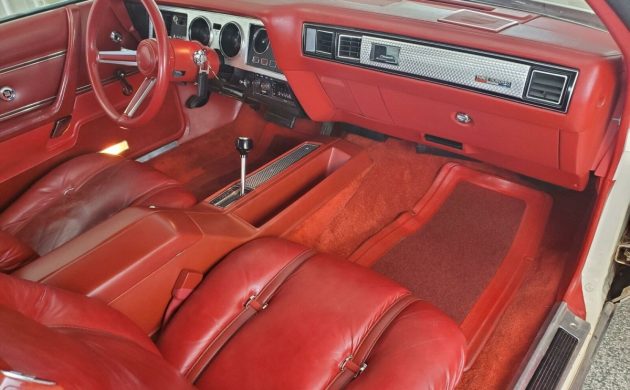
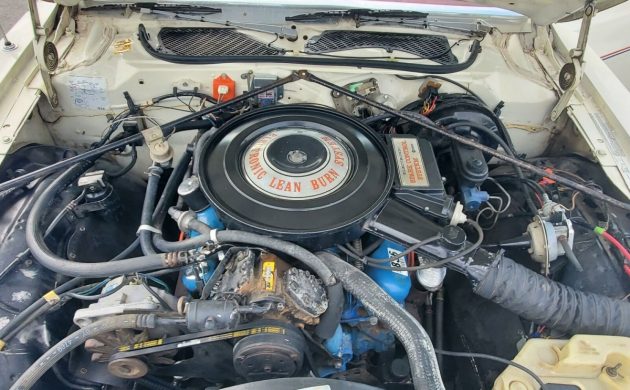
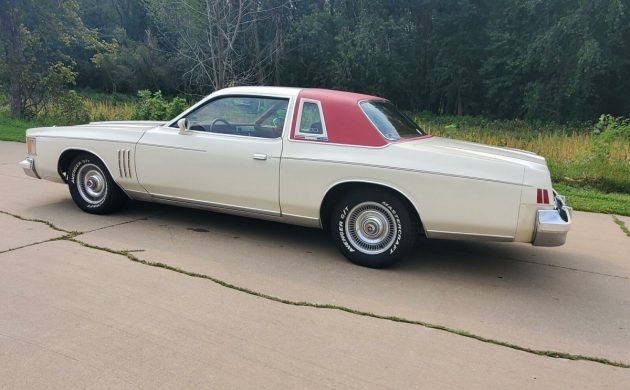




If you’re into late 70’s iron and this thing is truly ready to cruise in and enjoy, the price isn’t so bad, probably just a tad high. I can’t get past that headache red interior that seemed to grace 40% of Chrysler products from 1972 to 1982 or so.
I really like the reverse color combo! I may be the oddball, but I the sea of red interior.
Nice car! This could be a ‘one of’ car as the 300’s didn’t come with a half vinyl top…plan roof, T-tops, or sunroof, that’s it. I suppose it could have been ordered that way (unless someone wanted to make a clone out of a regular Doba!). I’m no expert, but I did buy one brand new that I still have…and drive…180,000 on the clock with the original drivetrain. Amazing how long things last with routine maintenance.
I just wonder if the half vinyl top was an add on,I saw one of those years ago with a off white top also,my wife owned one of these when we first got together and it was no slouch performance wise considering the era that it was built in.
Gary, I also bought one new for the wife. Sunroof, 160 made.
Richard Carpenter bought a new T-Top. 175 made.
Richard later sold his to his secretary.
I sold ours to my Uncle.
If memory serves, it would do 133 mph. Possibly the fastest production car in 1979.
I bought spare everything 300 when new.
You are correct in that no half vinyl tops made.
Funny that you should mention Richard Carpenter. Some years ago I saw an ad on eBay that was all caps selling a Plyoumity Fury owned by Richard Carpenter. A friend of mine had what he was told was Richard’s business number. I had the auction up on my screen so I could leave the information on an answering machine and dialed the number.
Imagine my surprise when he answered the phone!! He and Mary were very nice as I gave them the auction number and they both laughed when they read it. He told me the car’s history and asked me why I called and where I got the number from. He was appreciative of my concern that a seller was using his name to sell a car.
Stunning vehicle, I’d bolt performance headers on and a few other modifications to get 250 horse power out of it.
Excellent write up Adam.
Talk about putting lipstick on a pig! The Cordoba was a slow, thirsty and unreliable lump of a car, and all the 300 was , was a gussied up version of the same. And that “lean burn ” engine? If it started and ran, that alone was an accomplishment. These cars were made in what was a bad time at Chrysler as well as for the rest of the American auto industry.
I have one from AZ with 24k miles and I can tell you it goes just fine. Not a 1/4 mile car, but what was back then, considering that this was as fast as a Vette then? the lean burn works fine, thank you!
The red interior is a delight, after so many greige, or almost black boring interiors! You can also fit 5 adults in it comfortably
with stuff and cruise all day!
BTW, all of the well-researched articles on this 300, puts production at just over 4,000 cars. I worked in the Product ID Studio and the studio manager said it was musical badging with marketing- 300 or 300M. When the music stopped, it was 300. There are 14 places on the car that have 300 on it, so it really should have been the M; not the LH trim package 20 years later. There is every check box to be a true 300.
somebody added the red vinyl half-top after the car was sold, that really detracts from the clean look the designers intended.
I have seen the best maintained restored 300 from Cincinnati that sold for only $10k a couple of years ago with less mileage…
I wonder why front cornering side lights & even vinyl roofs are not avail on contemporary “cars”. Or even FULL wheel covers that would prevent today’s poorly primed/paint steel wheels from rusting. Or even foot operated parking brake pedals for non sports cars.
Thanks. I think both features would do very well on today’s modern sport utilities and crossovers since they don’t have any real sporting pretensions and are about features and style.
The epitome of the Malaise Era of the Auto Industry.
So… What were YOU designing and driving then? :-)
Driving my first new vehicle: a 1977 F150 4×4. The salesman couldn’t tell me what the torque and HP numbers were because Ford stopped publishing them.
Before the Malaise Era cars rusted out fast, guzzled gas, and went fast. Nobody cared because gas was cheap.
During the Malaise Era cars rusted out fast, guzzled gas, and went slow. Everyone cared because by then gas was pushing $1 per gallon, a four-fold increase in six years.
I had a T-Top 300 in the mid 80’s. Original owner dumped the leanburn and retro’d a early/mid 70’s Chrysler electronic ignition system with MSD box. Mine ran real well honestly. The tops leaked water of course – LOL
I am pretty familiar with these cars. Just a couple of notes. These came without vinyl tops. You can Google the sales literature to verify. This top is an aftermarket addition. The non Chrysler specific moldings around the roof is another sure giveaway. The right front cornering light lens is missing. These are getting very difficult if not impossible to find. The hunt for one is always fun and rewarding when met with success. The left front wheel opening molding is smashed. A good and patient restoration guy might be able to straighten this out. Probably most disturbing is the last photo in the Ebay ad that shows between the fender and door. That in my experience is way too filthy for a 40K mile car. Don’t get me wrong, this is a nice car. Pristine and perfect it is not and should not be represented and priced as such.
Nice looking car and for what it is a very nice example. $21.5k seems optimistic, but a vehicle is worth what someone is willing to pay for it. Maybe the ad will attract a buyer who has been looking for a 300 of this vintage and everybody will walk away happy.
The best researched articles confirnms a little over 4000 car were built. Timing was bad as Fake Energy Crisis 2 made them unpopular due to mileage concerns of 15 mpg. You could buy TWO Omni-Horizons for the price of a 300!
I worked for Car Cameron Product ID Studio Manager, who told me that this was supposed to be a 300M. Musical badging stopped with Marketing getting it as just a 300, despite having 300 on it in 14 places!
The design intent for the car was a clean design, so a vinyl top was never offered by the factory- let alone a red vinyl, half-top!
I have a 24k mile AZ 300 and will say it is a fine cruise car, holds 5 adults, and all the stuff you need in the large trunk. The Lean Burn problem is a fallacy.
A friend had the best original, well maintained 300 he bought new I ever saw and could only get $10k for it. This example is a decent looking car but will need a lot of TLC to bring it up to that level, never mind double the price.
Why no pic of the front end? Just one useless close up of the grille emblem? I find that very suspicious. Other problems, already mentioned by others, seem to make the price unrealistic. However, since it’s A dealer, there is probably some wiggle room.
Here we go again with those white letter tires on something they shouldn’t be on. Damn hicks!
IF I could post a photo here you would see the original 2 page flyer for the 300 came with GR60-15 RWL tires from the factory! Ignorance of reality, is the only “hick” trait! THAT was what people wanted and expected in 1979. NOT in 1989, 1999, 2009, or 2019!
There was a large aftermarket, by shops and dealers, putting on vinyl tops, with extruded aluminum moldings. Chrysler never offered this 300 with one.
The leather was from Seton Leather Co, dyed red thru it and not painted on. The marketing guys got the bright idea to use Ricardo Montalbon as product spokesman and he was surprisingly memorable and effective, because of his mild accent and the tagline.
Looks like Rich Corinthian “ Lather “!
Has a 1977 ‘Doba, that was a great car, 360 Lean Burn which never gave me problems ( I was truly blessed ). RWL tires were the rage back then, and no I am not a hick. It was what guys at that time preferred, everyone had them on these type of vehicles. The asking price is what anyone who wants it can pay. There is nothing special about this car, I always thought the Cordoba to be a good looking car. I am 58, and this car is still good looking, just not 22 large good looking
The vinyl top does kind of ruin this car for me. I remember these in the showroom when new. The slick top and lack of typical adornments de jour is what made them special. Kind of a bummer they didn’t use the Magnum front end and that the round headlights of earlier Cordobas were out of style in ‘79. Someone once referred to these vertical rectangular lights as “walk-don’t walk”.
Taste is a personal thing, and I always liked Chrysler’s Tapestry Red trims of 1978-79. After many years of nothing but GreyTanCharcoalMochaBlack interiors in contemporary vehicles it looks even better today, in my opinion, but as always, your mileage may vary.
Thank you John Sanderson, to use a movie quote, ” Some men you just can’t reach”. RWL tires were what people at the time wanted, if your car couldn’t go fast, it could look like it wanted to go fast. Paul C, do you hear that ………. crickets. Hicks unite, I still like RWL on certain vehicles, that’s why they still make them. Movie quote is from Cool Hand Luke, great movie with an awesome supporting cast. Sometimes nothin is a real cool hand.
My grandparents owned a very similar 1977 Cordoba, pretty much all the same equipment, white with burgundy roof & interior. This car remindes me sooooo much of their car!
If I had the resources, I would buy this car, even at the inflated price, and drive it proudly in their memory. Very nice car!
This is not a Cordoba 300. It is a Cordoba 300 Sport. HUGE difference. Real 300s did not EVER get a vinyl roof. Real 300s did not EVER get Lean Burn. Real 300s did not use a 318 as shown in these photos.
Very nice car, but not a “real” 1979 300.
Kevin McCabe.
My serial for my new 1979 300 is SS22L9R164309.
This is a real 79-300.
Package code on fender plate will have A74.
That needs to be in ads, always if possible.
That is the only info missing in ad to confirm.
The E58 #60-4V was the ONLY engine available with the A74 Cordoba 300 package. The E58 however was available on ANY ’79 Cordoba. Among the many restrictions listed in the order guide for this car is “N/A with Vinyl Roof”. For that matter a vinyl roof wasn’t available on an A84 300 Decor Package car either. If your car really is a 300, post the broadcast sheet. As John Sanderson and several other posters have indicated this car is highly questionable. If you don’t have the broadcast sheet, post a photo of the car’s fender tag. There will be items punched into it that will confirm or refute